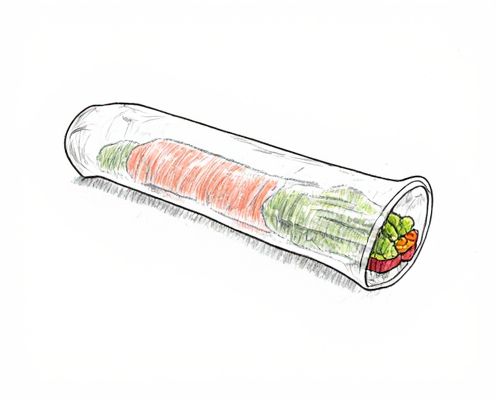
Reusable food wrap Illustration
Reusable food wraps provide an eco-friendly alternative to single-use plastic wraps, helping to reduce waste in the kitchen. Made from materials like beeswax or silicone, they offer a sustainable way to preserve freshness and keep food items airtight. These wraps are washable and durable, making them a cost-effective solution for everyday food storage.
Introduction to Reusable Food Wraps in Modern Kitchens
Reusable food wraps, crafted from beeswax, cotton, and plant-based oils, provide an eco-friendly alternative to single-use plastic wraps in modern kitchens. These wraps maintain food freshness by sealing containers and covering produce while reducing waste and promoting sustainability. By incorporating reusable food wraps into Your kitchen routine, you contribute to a healthier environment and reduce your household's plastic footprint.
Key Benefits of Switching to Reusable Food Wraps
Reusable food wraps reduce plastic waste significantly by replacing single-use cling films, promoting eco-friendly kitchen habits. Made from materials like beeswax and cotton, these wraps are breathable, antibacterial, and maintain food freshness longer. Their cost-effectiveness and durability make them a sustainable choice for preserving fruits, vegetables, and leftovers.
Popular Materials Used in Reusable Food Wraps
Reusable food wraps commonly utilize beeswax, cotton fabric, and jojoba oil for their natural antibacterial and moisture-resistant properties. Organic cotton provides breathability while beeswax creates a flexible, clingy surface that extends food freshness. Some wraps also incorporate tree resin to enhance stickiness and durability, making them eco-friendly alternatives to plastic cling films.
Comparison: Reusable Wraps vs. Traditional Plastic Wrap
Reusable food wraps, typically made from beeswax-coated fabric, offer a sustainable alternative to traditional plastic wrap by significantly reducing single-use plastic waste and promoting eco-friendly kitchen habits. Unlike plastic wrap, reusable wraps are breathable, allowing food to stay fresher longer, and can be washed and reused multiple times, enhancing cost efficiency over time. However, traditional plastic wrap provides a tighter seal and greater transparency, making it more suitable for airtight storage and visibility of contents.
Eco-Friendly Impact of Reusable Food Wraps
Reusable food wraps significantly reduce plastic waste by replacing single-use plastic wraps and bags, cutting down landfill contributions and pollution. Made from natural materials like beeswax, cotton, and tree resin, these wraps are biodegradable and compostable, ensuring minimal environmental impact. You can actively support sustainability by choosing reusable food wraps that help conserve resources and lower your carbon footprint.
How to Properly Use Reusable Food Wraps in Everyday Cooking
To properly use reusable food wraps in everyday cooking, start by selecting the right wrap size to cover bowls, fruits, or sandwiches securely. Warm the wrap slightly with your hands to activate the natural adhesive properties, allowing it to mold tightly around food items or containers. After use, wash the wrap with mild soap and cool water, air dry, and store it away from heat to maintain its durability and eco-friendly benefits.
Tips for Cleaning and Maintaining Reusable Food Wraps
To clean reusable food wraps effectively, rinse them with cool water and mild dish soap, avoiding hot water that can damage the fabric. Air dry the wraps completely before storing to prevent mold and odors. Regularly inspect for wear and replace wraps when they lose their stickiness or develop holes to ensure optimal food safety and longevity.
Creative Ways Women Can Incorporate Reusable Food Wraps
Reusable food wraps offer versatile solutions for women seeking eco-friendly kitchen alternatives by creatively covering bowls, wrapping sandwiches, and preserving fresh produce. You can customize these wraps with vibrant patterns to match your kitchen decor while reducing plastic waste significantly. Incorporating beeswax or silicone wraps in meal prep routines not only enhances food freshness but also supports sustainable living practices.
Choosing the Best Reusable Food Wrap for Your Kitchen
Selecting the best reusable food wrap involves evaluating materials like beeswax, silicone, and cotton alternatives for durability and effectiveness in preserving freshness. Consider wraps with breathable yet moisture-resistant properties to reduce waste and maintain food quality. Prioritize eco-friendly options that are non-toxic, washable, and compatible with various food types to enhance sustainability in your kitchen.
Sustainable Kitchenware Trends: The Future of Reusable Food Wraps
Reusable food wraps crafted from beeswax, cotton, and plant-based materials represent a pivotal shift in sustainable kitchenware trends, reducing reliance on single-use plastics and minimizing food waste. Innovative designs now enhance airtight sealing and durability, promoting long-term use and environmental conservation. Growing consumer demand for eco-friendly alternatives drives continuous advancements in the biodegradable and compostable food wrap market.
 womendy.com
womendy.com